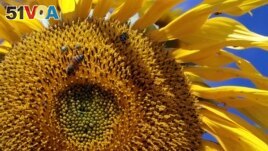A new study suggests changes in world climate and land use are sharply reducing the number of insects needed for pollinating crops.
The study looked at thousands of species and areas around the world. It found that the number of pollinating insects dropped by 61 percent during periods of abnormally high temperatures and reduced supply of flowering plants.
Leaders of the study noted that bees, flies, moths and other pollinators are more affected than the general insect population. Results of the research recently appeared in the publication Science Advances.

Bees and other insects gather on a sunflower at the Agro Brasilia, an agricultural exhibition on the outskirts of Brasilia, Brazil, May 18, 2012. (AP Photo/Eraldo Peres, File)
"We're seeing the climate change is already having this really strong impact on pollinators," study co-writer Tim Newbold told The Associated Press. He is an ecologist at the University College of London.
The U.S. Department of Agriculture estimates about 35 percent of world food crops and 75 percent of flowering plants depend on insects and other animal pollinators to reproduce.
The study found the biggest problems with pollinator loss are in the tropics – areas that sit close to Earth's equator. The countries most at risk of crop loss from reduced pollinators include China, India, Indonesia and Brazil. Sub-Saharan Africa is also in danger, especially its cocoa and mango crops, the study found.
Given the current situation, the researchers said some important tropical crops – especially coffee and cocoa – could be badly hurt. Those plants depend heavily on bees and flies to help them reproduce.
Past studies have shown insect populations are decreasing for several reasons, including climate change and loss of habitat. Other studies have shown shrinking numbers of pollinators, with coffee and cocoa plants especially harmed by the absence.
Newbold, from the University College of London, said he sees a "double hit of climate change" affecting the coffee plants themselves, as well as the pollinators they depend on.
This does not mean, however, that there will be no coffee or chocolate available, said the study's lead writer, Joe Millard. It will just mean buyers will have to pay more for them. Millard is a computational ecologist at the Natural History Museum in London.
University of Delaware insect expert Douglas Tallamy – who was not part of the research – said this study is unusual because it centered on the tropics, which other research has not. "We're not paying enough attention to the tropics," Tallamy said. "They are important."
Newbold noted that pollinating insects in the tropics are likely hit harder than other places because they are already near their temperature limits that place them at risk. "Massive warming in the tropics is pushing those species over the edge," Newbold said.
Habitat loss is the main driver for the shrinking number of pollinators because it leaves less food for them, Millard said. Climate change, parasites, disease, and chemicals in the environment add to that difficulty.
Newbold said scientists are still trying to find out why pollinators seem to be suffering worse effects from warming temperatures than other insects. It could be because they have hairier legs and bodies that help them carry pollen, the researchers said.
It is like "being forced to have a big furry coat and it's getting hot," Newbold said.
But the University of Delaware's Tallamy is not so sure. He said that the study's data is solid, but its explanation as to cause of impact is more of a guess.
I'm Bryan Lynn.
The Associated Press reported this story. Bryan Lynn adapted the report for VOA Learning English.
____________________________________________
Words in This Story
pollinate – v. to carry pollen from a male part of a flower to the female part of another flower of the same type
habitat – n. the natural environment of a plant or animal
impact – n. the affect a person, event or situation has on someone or something
parasite – n. a plant or animal that lives on or inside another plant or animal in order to get food
pollen – n. a powdery substance produced by flowers that is carried by insects or wind and makes other flowers produce seeds
guess – adj. to form an opinion of from little or no evidence
